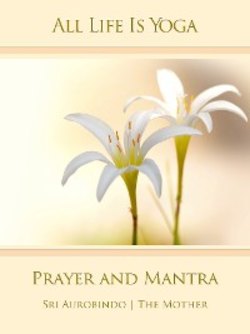Читать книгу All Life Is Yoga: Prayer and Mantra - Sri Aurobindo - Страница 10
Chapter I The Meaning of Prayer
ОглавлениеWords of Sri Aurobindo
The life of man is a life of wants and needs and therefore of desires, not only in his physical and vital, but in his mental and spiritual being. When he becomes conscious of a greater Power governing the world, he approaches it through prayer for the fulfilment of his needs, for help in his rough journey, for protection and aid in his struggle. Whatever crudities there may be in the ordinary religious approach to God by prayer, and there are many, especially that attitude which imagines the Divine as if capable of being propitiated, bribed, flattered into acquiescence or indulgence by praise, entreaty and gifts and has often little regard to the spirit in which he is approached, still this way of turning to the Divine is an essential movement of our religious being and reposes on a universal truth.
The efficacy of prayer is often doubted and prayer itself supposed to be a thing irrational and necessarily superfluous and ineffective. It is true that the universal will executes always its aim and cannot be deflected by egoistic propitiation and entreaty, it is true of the Transcendent who expresses himself in the universal order that being omniscient his larger knowledge must foresee the thing to be done and it does not need direction or stimulation by human thought and that the individual’s desires are not and cannot be in any world-order the true determining factor. But neither is that order or the execution of the universal will altogether effected by mechanical Law, but by powers and forces of which for human life at least human will, aspiration and faith are not among the least important. Prayer is only a particular form given to that will, aspiration and faith. Its forms are very often crude and not only childlike, which is in itself no defect, but childish; but still it has a real power and significance. Its power and sense is to put the will, aspiration and faith of man into touch with the divine Will as that of a conscious Being with whom we can enter into conscious and living relations. For our will and aspiration can act either by our own strength and endeavour, which can no doubt be made a thing great and effective whether for lower or higher purposes, – and there are plenty of disciplines which put it forward as the one force to be used, – or it can act in dependence upon and with subordination to the divine or the universal Will. And this latter way again may either look upon that Will as responsive indeed to our aspiration, but almost mechanically, by a sort of law of energy, or at any rate quite impersonally, or else it may look upon it as responding consciously to the divine aspiration and faith of the human soul and consciously bringing to it the help, the guidance, the protection and fruition demanded, yogaksemam vahamyaham.
Prayer helps to prepare this relation for us at first on the lower plane even while it is there consistent with much that is mere egoism and self-delusion; but afterwards we can draw towards the spiritual truth which is behind it. It is not then the giving of the thing asked for that matters, but the relation itself, the contact of man’s life with God, the conscious interchange. In spiritual matters and in the seeking of spiritual gains, this conscious relation is a great power; it is a much greater power than our own entirely self-reliant struggle and effort and it brings a fuller spiritual growth and experience. Necessarily in the end prayer either ceases in the greater thing for which it prepared us, – in fact the form we call prayer is not itself essential so long as the faith, the will, the aspiration are there, – or remains only for the joy of the relation. Also its objects, the artha or interest it seeks to realise, become higher and higher until we reach the highest motiveless devotion, which is that of divine love pure and simple without any other demand or longing.
*
....
